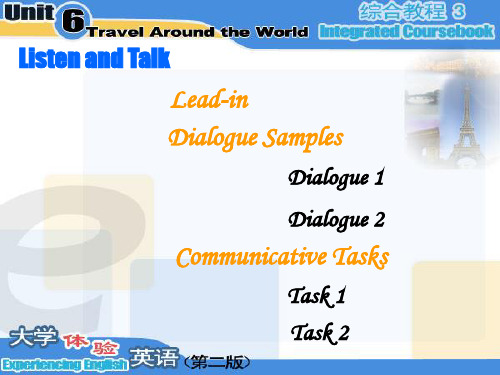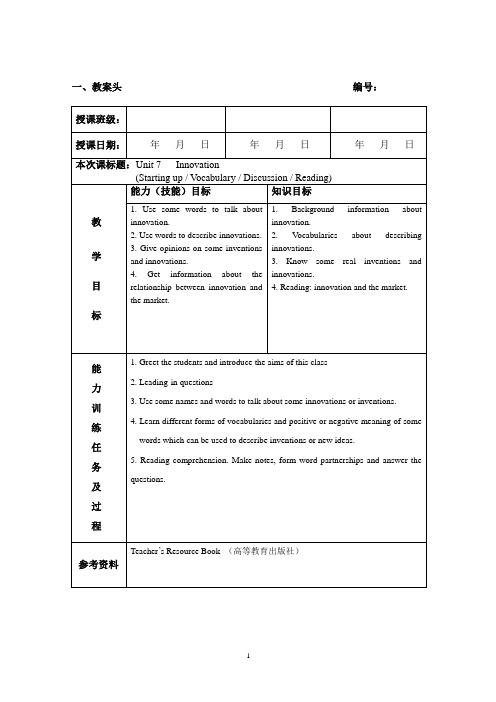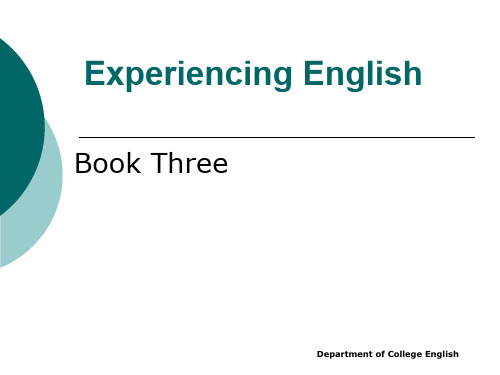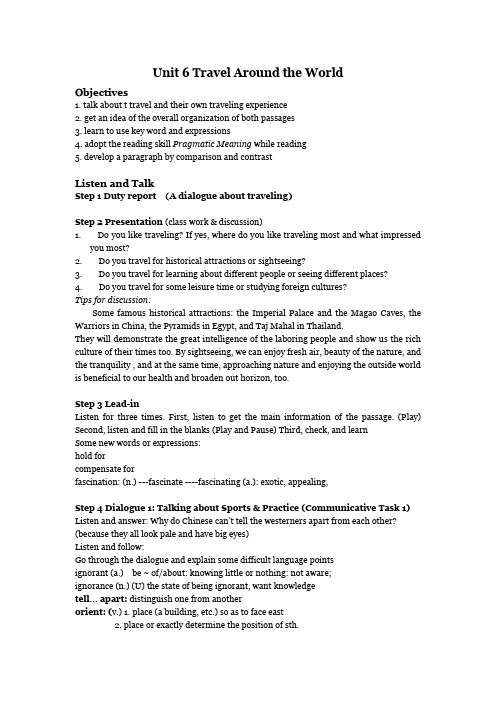体验商务英语3教案 unit 6 1st
体验商务英语3教案 Unit 2 1st

1
二、教学设计
步 骤
教学内容
告知
(教学 内容、 目的)
引入
(任务 项目)
1. Lead-in: Starting up
2. Vocabulary: Brand management
3. Listening: What is branding? 4. Reading: Fashion piracy Lead-in: Starting up Q1: Are they international or national brands? Q2: What image and qualities does each one have? Q3: Do the products have anything in common? Q4: For example, when you buy jeans, do you always buy
20m Ss match the words to the meanings.
力)
深化
(加深
Listening: What is branding? This listening comes from an authentic interview with a
听力 理解
25m
对基本 marketing specialist. The exercises focus on prediction and
Ss listen to the tape and note.
能力的 listening for information.
体会)
归纳
(知识 和能 力)
训练
(巩固
拓展 检验)
总结
1. Different words and phrases describing brand mangement. 2. Process of branding.
大学体验英语综合教程3[第三版]Unit6PPT课件
![大学体验英语综合教程3[第三版]Unit6PPT课件](https://img.taocdn.com/s3/m/f118513a783e0912a2162a95.png)
She knows every nook and cranny in and around Cairo — no easy feat. Cairo with its complex system of streets and lanes, its quarters and markets is like a labyrinth invented by ancient storytellers. Hundreds of mosques — many of which are masterpieces of Islamic architecture, old neighborhoods with houses boxed together, huge apartment buildings on the outskirts and the Nile calmly running through it; all are part of this overcrowded city.
I feel a firm hand holding my left arm. “You want taxi, follow me,” the woman says. She doesn’t ask, she simply pulls me through the crowd. I follow her willingly. There is this moment when a tourist, particularly a woman, simply has to trust someone. We stop at a worn car. It has seen a better day, there are quite a few scrapes on its body, the tires are bald and there is a crack in the windshield. But it is a car for hire, and the woman will personally drive me. I breathe a sigh of relief when she puts my bag into the trunk, locks it and gets behind the wheel. “I will drive you, don’t worry,” she says.
大学体验英语第三册电子教案(第二版)unit6-B3U6-Data bank for class design-B3_U6_L-T

a pretty big benefit
observation of life
on the road ahead
encounter people and places
rewarding enlightenment observant compensate enrich life and memories additional fascination devote one’s full attention the misery of moving about create a perfect atmosphere
Listen and imitate
Dialogue 1 Everyone is Culturally Ignorant About Something
Dialogue Samples
Dialogue 2 Transportation Possibilities Lead-in question
Lead-in
Task 1 Catching the missing information Lead-in questions
2. Where do you like to travel? Open
Lead-in
Listen and read
Listen and complete
I often find myself trying to explain the attraction traveling 1)_______ for me. Traveling, according to many people, is often 2)______________ and even, at least sometimes, dangerous. But one benefit of traveling is that it creates a perfect atmosphere for the 3)_________________, an environment that can lead to better understanding and enlightenment. Many wonderful people and places lie 4)________________. The fact that there are obstacles as well only makes the journey 5)_______________. My life and my memories will be enriched after encountering these people and places. That’s a pretty big benefit!
体验商务英语3教案 unit 7 1st

Teacher’s Resource Book(高等教育出版社)
二、教学设计
步骤
教学内容
教学方法
Activities (学生活动)
Time
(时间)
告知(教学内容、目的)
1. Background information about innovation.
2. Vocabularies about describing innovations.
深化(加深对基本能力的体会)
Vocabulary: Describing innovations
1. Different word forms of the vocabulary
2. The positive meaning and negative meaning of the words used to describe inventions or new ideas.
总结
1. Different forms of vocabularies and positive or negative meaning of some words which can be used to describe inventions or new ideas.
2. Reading comprehension, making notes and forming word partnerships
一、教案头编号:
授课班级:
授课日期:
年月日
年月日
年月日
本次课标题:Unit7 Innovation
(Starting up / Vocabulary /Discussion/Reading)
教学目标
能力(技能)目标
大学体验英语第三册_unit_6

Sydney Opera House
Mount Rushmore National Memorial
Department of College English
Buckingham Palace
Leaning Tower of Pisa
Department of College English
Paris
to nature. 3. It is easier to make friends. 4. You get the chance to experience
things firsthand.
Department of College English
References
5. You can visit historical sights or scenic spots.
When you think of Egypt, what comes to your mind first?
Department of College English
Pyramids
The Sphinx
Department of College English
Culture Notes
What are pyramids? A pyramid is a massive structure built as a tomb or grave to house and protect the body of a pharaoh for the afterlife and as a monument to honor the pharaoh. It has four triangular sides that meet at a point. Pyramids were made from huge blocks of stone.
Unit 6 Travel Around the World Teaching plan大学体验英语三

Unit 6 Travel Around the WorldObjectives1. talk about t travel and their own traveling experience2. get an idea of the overall organization of both passages3. learn to use key word and expressions4. adopt the reading skill Pragmatic Meaning while reading5. develop a paragraph by comparison and contrastListen and TalkStep 1 Duty report (A dialogue about traveling)Step 2 Presentation (class work & discussion)1. Do you like traveling? If yes, where do you like traveling most and what impressedyou most?2. Do you travel for historical attractions or sightseeing?3. Do you travel for learning about different people or seeing different places?4. Do you travel for some leisure time or studying foreign cultures?Tips for discussion:Some famous historical attractions: the Imperial Palace and the Magao Caves, the Warriors in China, the Pyramids in Egypt, and Taj Mahal in Thailand.They will demonstrate the great intelligence of the laboring people and show us the rich culture of their times too. By sightseeing, we can enjoy fresh air, beauty of the nature, and the tranquility , and at the same time, approaching nature and enjoying the outside world is beneficial to our health and broaden out horizon, too.Step 3 Lead-inListen for three times. First, listen to get the main information of the passage. (Play) Second, listen and fill in the blanks (Play and Pause) Third, check, and learnSome new words or expressions:hold forcompensate forfascination: (n.) ---fascinate ----fascinating (a.): exotic, appealing,Step 4 Dialogue 1: Talking about Sports & Practice (Communicative Task 1) Listen and answer: Why do Chinese can’t tell the westerners apart from each other? (because they all look pale and have big eyes)Listen and follow:Go through the dialogue and explain some difficult language pointsignorant (a.) be ~ of/about: knowing little or nothing: not aware;ignorance (n.) (U) the state of being ignorant, want knowledgetell… apart: distinguish one from anotherorient: (v.) 1. place (a building, etc.) so as to face east2. place or exactly determine the position of sth.Oriental (a.) oriental(a.) orientation (n.)Read and practice:Communicative task 1:Work in groups and make dialogues (Row 1&3, etc. )Step 5 Dialogue 2: talking about sports & Practice (Communicative Task 2) Liste n and answer: What’s the most expensive of the four, bus, taxi, jeepney or rickshaw? (Bus)Listen and follow:Go through the dialogue and explain some difficult language pointscoincide (v.) 1. be in harmony or agreement ~ with…2. happen at the same timecoincidence (n.)rip sb. off: steal (it) or defraud (him)Read and practice:Communicative task 2:Work in groups and make dialogues (Row 1&2,etc. )Discussion1. Do you like traveling? If yes, where do you like traveling most and what impressedyou most?2. Do you travel for historical attractions or sightseeing?3. Do you travel for learning about different people or seeing different places?4. Do you travel for some leisure time or studying foreign cultures?Assignment:1. make a new dialogue2. preview Passage A and do some preparation about the city: CairoRead and ExplorePassage A The Woman Taxi Driver in CairoStep 1 Warming-up (group work)Choose one or two groups to demonstrate their dialogues.Discuss in groups about the culture notes then choose one group leader to collect the answer and report to the whole class.Step 2 Pre-reading Qs (pair-work)Work in pairs and discuss the following questions:1. What attracts you most when you visit a new place?2. Do you think consciously or unconsciously, that some cultures are superior orinferior to others? Why?3. Can you understand a culture through media channels instead of learning things inperson? Explain.4. Some people say that Australia is no worth going because it has no culture there, doyou agree? If you have the right to choose, which is the place you’d like to go to the most?Step 3 Global-reading1. Read the title and guess what type of writing this passage may be. (Narrative writing)2. Read the passage for the first time and answer:What is the author’s impression of Nagat?What is your impression?Step 4 Further-reading1. Outline:Part I (1—2): It tells readers the name of the woman taxi driver and the place where the author met herPart II (3—9) The writer recalls the experience which took place between Nagat and her in Cairo, and gives the readers a concrete description of Nagat.Part III (10) The writer introduces Nagat to you if you want to go to Cario.2. Comprehension questionsP122 Ex 2 and 3Step 5 Read and explore:1. Retell the text2. Oral discussion: P124 Ex8Summary: Arriving alone in a new city late at night can be a difficult experience and even more so if it is in a foreign country with a strange culture. Here the writer, herself a woman, remembers her luck in meeting Nagat, one of the few women taxi drivers in Cairo. During her stay in the city, Nagat became her driver and guide, taking her to visit many of the impressive sights, such as mosques, museums and the pyramids. Along the way the writer was deeply impressed by Nagat’s friendliness, determination, effectiveness and independence.Discussion1. What attracts you most when you visit a new place?2. Do you think consciously or unconsciously, that some cultures are superior orinferior to others? Why?3. Can you understand a culture through media channels instead of learning things inperson? Explain.4. Some people say that Australia is no worth going because it has no culture there, do you agree? If you have the right to choose, which is the place you’d like to go to the most?Assignment1. Retell the textStep 6 Language Points1. for that matter: as far as the thing is concerned; with regard to that, about that 关于那件事e.g. I’m going to quit smoking, and so should you, for that matter.She didn’t come, and for that matter, she didn’t even telephone .2. counterpart: n. a person or thing which has the same purpose as another one in adifferent place or organization对应的人/物e.g. British police officers are working with their French counterparts to catch terrorists.考题:Pentagon studies have shown that women have only 55% the muscle strength and 67% the endurance of their male _______.A. partnersB. counterpartsC. colleaguesD. fellows(B)3. mill about/around: to move about in a disorderly or confused waye.g. Crazy ideas milled around his mind.The boys were milling about in the corridor.4. nook(s) and cranny (ies): small spaces, sub-divisions in a location, building, etc.e.g. The children searched every nook and cranny that might harbor a frog.5. core: n. the central part of sth.e.g. The earth’s core is a hot, molten mix of iron and nickel.The basic lack of government funding is the core of the problem.6. bald: a. 秃头的cf: hairless, uncovered 无装饰的cf: naked , barrene.g. He made a ______statement of the facts.A. smoothB. nakedC. baldD. hairless(C)7. crack: (n.)裂缝;裂口cf: split, chink ; 爆裂声,轰响cf: explosion, blow(v.)爆炸,裂开;发出爆裂声e.g. Don’t pour boiling water onto the glass or it will _________.A. crush压碎B. crack 裂开,伴有响声但未成碎片C. smash打碎,粉碎D. shatter粉碎8. deliberate (a.) 故意的,蓄意的,深思熟虑的cf: thoughtful, planned ;审慎的,从容的cf: conscious, intentionale.g. He entered the room with ~ steps.take ~ action 采取谨慎的措施take ~ aim 不慌不忙地瞄准 a ~ murder蓄意谋杀v. 仔细考虑,思考, 常与upon, over, about 连用e.g. He was slow to answer, deliberating over each question.9. economy (n.. )经济,节省,cf: thrift, providencee.g. In the long run, it is an _______ to buy good-quality goods, even though they cost more.A. economyB. economics经济学C. economic 经济的,经济学的D. economical 经济的,省钱的10. efficient (a. ) 有效率的,最经济的,有能力的(反)inefficienteffective形容人或物,有时用于法律的生效,制度的实施efficient 能够产生某种结果的,有能力的effectual产生决定性的完满结果的,有奏效的,不形容人efficacious与efficient 意思相同,但不用于形容人,通常形容药,或治疗方法e.g. She is very _______secretary; she never forgets anything or makes a mistake.A. anxiousB. effectiveC. adequateD. efficient11. lane 小路,小巷,狭路,单向行车道,跑道e.g. The president walked down a _______between two lines of soldiers and sailors.(A )A. laneB. pass 难以行走的山路或关口C. path 人行道,轨道D. road马路,公路,人行道12. relief (n.) 减轻,解除,救助,接替者,缓和剂,cf: ease, freedom, replacement,substitution,浮雕,凸版e.g. The government provided ______ for people whose homes had been destroyedby the storm.A. reliance依赖,依靠B. resourceC. reproductionD. relief (D)13. sightseeing (n.)观光,游览e.g. When they were in Beijing, most of their time was spent in sightseeing.People like going _____ in different countries to learn cultures there in person.A. insight洞察力,深刻见解B. sign 标记,符号C. sightseeingD. sight 地方,名胜14. spare (a.)多余的,剩下的,空闲的,备用的,节省的(v.) 赦免,宽恕,分出,匀出,节约,爱惜If you have any money to _______, you might lend us some.A. spareB. affordC. saveD. reservespare sth. for sb. /sth. , spare sb. sth. 与某人分享某物15. has been a better day风光不再,曾经盛极一时e.g. This university isn’t famous today, but it has been a better day.Step 7 Exercises of Passage AAssignment1. review , prepare for the dictation2. written work: general writingPassage B A Russian ExperienceStep 1 Warming-up (group work)Discuss in groups about pictures on p126, then choose one or two groups to demonstrate their questions and answers about their favorite way of traveling.Step 2 Pre-reading Qs (pair-work)Work in pairs and discuss the following questions:1. What reasons do people travel?Some travel to enjoy the beautiful scenery of their desired places; some resort to traveling to get released from the pressures and stress of the modern busy life while some others goto some particular places for shopping. In a word, by traveling, people’s lives can be greatly enriched.2. What is travel all about?旅游的真谛/ What does the significance of traveling lie in?Step 3 Global-reading (class work, individual work)1. skim the passage and find out the author’s answer to the question: What’s travel all about:(to get to the soul of the people, understand and experience their lives) (para9)2. p128 (10) 2.Step 4 Further-reading (group work)1. OutlinePart I (para1—2) The author was absorbed by Russian history since childhood and came to St. Petersburg which was a popular choice to tourists.Part II (para3—4) The author describes the great view of St. Petersburg and its people. Part III (para5—8) The author got a warm welcome and was entertained heatedly in Yuri’s and she had an enjoyable time.Part IV (para9) the author concluded what travel is all about.2. Scan the passage and find out the answers to these questions:1) Why is St. Petersburg a popular choice for tourists?(It has rich cultural history.)2) How did the author travel to Russia?(by airplane.)3) Why did the author go to Yuri’s as a guest?(the author met a woman in Moscow and Yuri was a dear friends of hers. She invited the author into Yuri’s)More questions on P128 Ex10Step 5 Read and explore:1. Retell the text2. Reading skill practiceSummary:The writer recalled a trip with her husband to the Russian city of St. Petersburg. She gave an account of the city, which combined practical design with great beauty. She remembered one particular evening when they were invited to the home of a Russian artist, Yuri, whose apartment was in a building which had once been a palace. Although the writer was fascinated Russia, its art, literature and people, she had never learned to speak the language and felt rather ashamed for that, but fortunately their host spoke English. They were served the famous Russian vodka, made many toasts and soon her husband and Yuri became great friends. Later on, walking back to their hotel along the Nevsky Prospect in the soft light of a long summer evening, the couple agreed that the visit had been the best part of their holiday.Step 6 Language focusDifficult sentences:1. Not only did this seem practical, but the idea behind the design was to shelterresidents from the fierce winter winds.2. No wonder the sight of elegant buildings along the canals reminded me of ParisAmsterdam and Venice.no wonder (that )难怪,~ he failed the exam.Key words and phrases:1. absorb: to make sb. greatly interested inbe absorbed in …:be concentrated / focused on…; be attracted by…e.g. She was so absorb ed in her job that she didn’t hear any body knocking the door.I was completely absorbed by his novel.2. avenue: 林荫道,大街;方法,途径In the evening, people of the city like to walk into the ______ along the river.A. roadB. pathC. streetD. avenue (D)3. beloved (a.) dearly loved 被爱的,为…所爱的,(n.) 爱人,被心爱的人,e.g. The old man was beloved of everyone in the village.4. entertain (v.) to keep (esp. a group of people ) interested or amused娱乐,助兴,款待,e.g. The magician entertained the children with a variety of tricks.entertainer (n.) sb. who entertains professionallyentertainment (n.) the act to entertainThere’s not much in the way of entertainment in this town—just the cinema and a couple of pubs.entertaining (a.) amusing and interesting5. fierce (a.) strong and powerful, violent,e.g. Fierce winds prevented the race from taking place on schedule.Owing to fierce competition among the airlines, travel expenses have been reduced considerably.6. positive (a.) 有事实根据的,确实的,断然的;cf: assured; certain, convinced,e.g. He was positive that he had seen the man before.be positive of/about/ that …对……有自信We have positive knowledge明确的知识that the earth moves around the sun.7. shelter: (n.) protection from bad weather, danger, or attacke.g. find/ seek shelter 寻找/找到避难处take shelter用作避难处(v.) to protect from harm shelter from 保护,掩护e.g. The deep trenches (洞) sheltered the soldiers from gunfire.8. give way to 被……代替to yield to; to collapse, break; to become loosenede.g. Traditional farming is giving way to modern methods.Don’t give way to your fears.9. in fine/great/good forms: doing sth. well表现良好;健康状况良好e.g. Keep in good form or you will lose the opportunity.10. what makes sb. tick 某人的行为或思想动机;做某事的理由11. thanks to: on account of; owing to; because ofe.g. Thanks to the advanced technologies, we can easily communicate with anyone inthe world now.12. take sth. for granted: to believe without even thinking about it; 想当然e.g. I didn’t realize that Helen hadn’t been to college – I just took it for granted.Assignment1. preview , prepare for the quiz2. grammar: paragraph development by comparison and contrast3. written work: practical writing。
大学体验英语第三册电子教案(第二版)unit6-B3U6-Data bank for class design-B3_U6_G_P

When Taksin’s reign ended in 1782, King Buddha Yodfa Chulaloke reconstructed the capital on the east bank of the river and gave the city a ceremonial name which became shortened to its current official name, KrungThep Maha Nakhon. center of Thailand.
The city has since vastly modernized and undergone numerous changes, including the introduction of transportation and utility infrastructure in the reigns of King Mongkut and King Chulalongkorn ,and quickly developed into the economic.
Unit 6 Group project
My Latest Travel Experience (using PPT).
An Unforgettable Tourist Site
韶关学院08级A20 班 林楚楠 郑冬璇 谢文伟 陈文杰
Bangkok is the capital, largest urban area and primary city of Thailand
Unit6It's 教案

Unit6 It’s 3:15!教学设计(第一课时)源潭镇台前小学杨秋群Ⅰ、Teaching content(教学内容)1、Phrases: get up,get dressed,go to school,eat dinner,go to bed2、sentences:What time is it?It’s…It’s time to…Ⅱ、Teaching aims (教学目标)1、Can listen say read and write the new phrases.2、Can listen say and read sentences: What time is it?It’s…It’s time to…3、Can create the conditions and make dialogues by using the sentences of this text.4、Can expand the other time’s expressing.e.g.What time is it?It’s five fifteen.It’s time to eat dinner.Ⅲ、Teaching point (教学重难点)Key point:Teaching aims 1 and 2.Difficult point: Teaching aims 3 and 4.Ⅳ、Teaching preparation (教学准备)CAI课件、phrases cards、Number cards、A clock etc.Ⅴ、Teaching process (教学过程)Step1 Searching preparation1、Greeting2、Let’s sing:Ten little candles dance.3、Guessing game.4、Free talk with a clock.Step2 Searching process and practice1、Teach the phrases:get up,get dressed,go to school,eat dinner,go to beda、Presentationb、Ss repeatc、Writingd、Actione、Practicef、Chant2、Ask and answer:a、T and Ssb、Groups workc、Chain actionStep3 Extension1、Time flies.2、Make a survey.3、Make a dialogue.Step4 Homework1、Read new phrases five times.2、Make your survey .Say in English about your day with your partner . Step5 Blackboard designUnit6 It’s 3:15!What time is it?It’s…get upIt’s time to get dressedgo to schoolgo to bedeat dinner。
- 1、下载文档前请自行甄别文档内容的完整性,平台不提供额外的编辑、内容补充、找答案等附加服务。
- 2、"仅部分预览"的文档,不可在线预览部分如存在完整性等问题,可反馈申请退款(可完整预览的文档不适用该条件!)。
- 3、如文档侵犯您的权益,请联系客服反馈,我们会尽快为您处理(人工客服工作时间:9:00-18:30)。
讲授
Summarize the contents of an application form for a letter of credit from the reading.
20min
训练(巩固拓展检验)
Writing: Write aletter, describing the benefits the company can offer and give references.
4. Starting up: students discuss questions about imports and exports. They also complete a chart placing countries according to natural resources and economic wealth.
写作练习
Write a letter.
10min
总结
eful words, phrases and collocations for talking about international trade.
2.Application form for aletter of credit.
归纳讲述
参考资料
Teacher’s Resource Book(高等教育出版社)
二、教学设计
步骤
教学内容
教学方法
Activities (学生活动)
Time
Hale Waihona Puke (时间)告知(教学内容、目的)
1. Warmer.
2. Overview.
3. Quotation: “Every time we buy a foreign car we put someone else out of work.
5. Vocabulary: Students study some useful words, phrases and collocations for talking about international trade.
6.Reading: Students read an application for a letter of credit, complete a form, answer comprehension questions and write a letter.
讲授
5min
引入(任务项目)
1.Warmer
2.Overview
3.Quotation
提问
Answer the questions
5 min
操练(掌握初步或基本能力)
1) Students discuss questions about imports and exports. They also complete a chart placing countries according to natural resources and economic wealth
Part A
1)Ask students to list five things which they own-expensive things, cheap things, clothing, machines, etc.
2)Get students to read the question.
3)Tell students to work through their list of five possessions, deciding which are imported and where they come from.
5min
作业
Keep the vocabularies in mind.
课堂练习
Practice in class
10min
后记
Period I:
Steps
(步骤)
Methods & Tasks(方法、任务)
Introduction
1. Warmer.
2. Overview.
3. Quotation: “Every time we buy a foreign car we put someone else out of work.
5)Get the students to debate the quotation in groups. Circulate and monitor.
Step Three
Starting up:
In this section students take part in some discussion activities designed to orient them to the theme of the unit and to provide some useful speaking practices.
一、教案头编号:
授课班级:
授课日期:
年月日
年月日
年月日
本次课标题:Unit6 Trade
(Starting up / Vocabulary /Reading)
教学目标
能力(技能)目标
知识目标
1. Discuss questions about imports and exports.
2. Talk about international trade.
3. Application form for letter of credit.
能力训练任务及过程
1. Greet the students and introduce the aims of this class
2. Warmer.
3. Overview.
4. Quotation: “Every time we buy a foreign car we put someone else out of work.
StepOne
Warmer: Question: Ten reasons to buy imported goods.
Divide the class into small groups.
Ask students to think of as many reasons as they can for why people in their country choose imported rather than domestically produced goods.
3)Get students in the for group to think of arguments to support the quotation and students in the against group to think of arguments disagreeing with it. Allow a couple of minutes.
阅读理解
The students read the article carefully and finish the exercise.
15min
归纳(知识和能力)
The contents of an application form for a letter of credit.
Exporter/ Importer/ Goods/ Quantity/ Value/ Method of payment/ Documents required/ Contract restriction
4. Starting up: students discuss questions about imports and exports. They also complete a chart placing countries according to natural resources and economic wealth.
Step Two
Quotation:“Every time we buy a foreign car we put someone else out of work..”
1)Divide the class into two groups: for and against
2)Ask students to read the quotation.
2)Vocabulary: Students study some useful words, phrases and collocations for talking about international trade.
分组讨论
Discuss questions and learn the vocabularies.
4)Redivide the class into groups of four to six students, each group containing a roughly equal number of students from the previous for and against groups.
20 min
深化(加深对基本能力的体会)
Reading: Letters of credit are used in international trade to guarantee payments. This reading section is based on a letter from an exporter requesting the bank to open a letter of credit.
